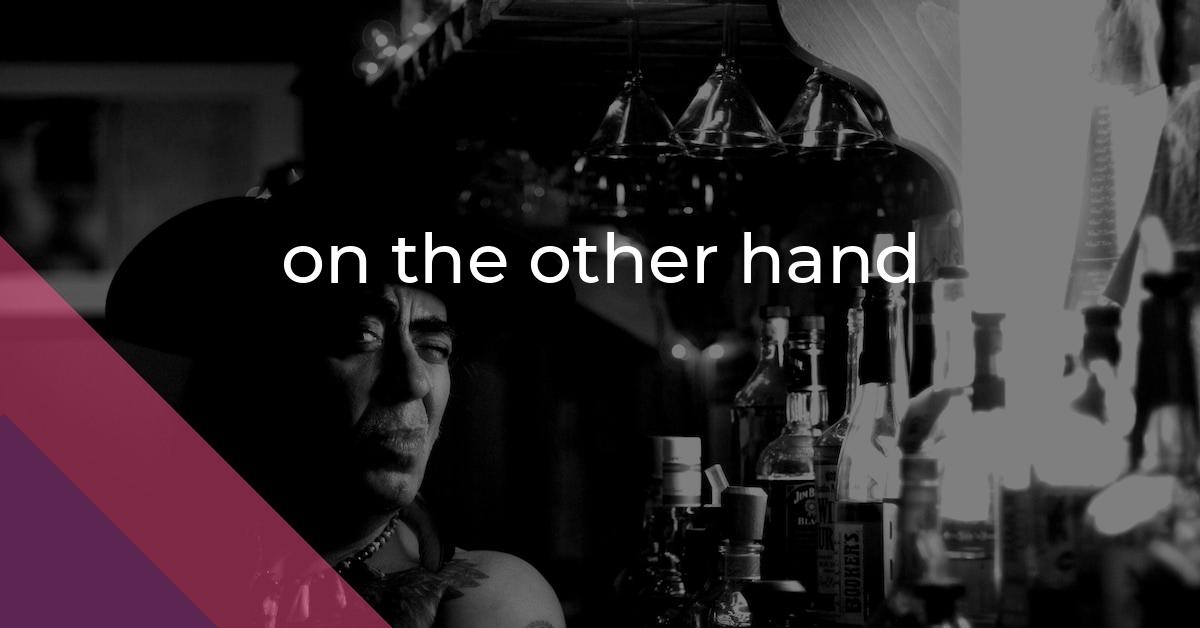on the other hand: Idiom Meaning and Origin
What does ‘on the other hand’ mean?
An idiom meaning to present an alternative viewpoint or contrasting information.

Idiom Explorer
The idiom "then again" is used to introduce a contrasting or opposite viewpoint or idea. It implies a shift in perspective or a reconsideration of a previous statement. It is often used when acknowledging a different argument or point of view.
The idiom "put forward" means to propose or suggest something for consideration or discussion. It is often used when presenting an idea, argument, or opinion in a formal setting or during a meeting.
The idiom "other side" refers to a different perspective, viewpoint, or position on a particular matter or issue. It implies considering alternate opinions or taking into account different aspects of a situation.
The idiom "on the other side of" is used to refer to a different viewpoint, perspective, or situation than the one currently being discussed or considered.
The idiom "on the one hand" is used to introduce a contrasting point or argument, indicating that there is another perspective to consider. It suggests that there are different sides to a situation or decision.
The idiom "on opposite sides of the barricades" means to have conflicting opinions, beliefs, or positions in a particular situation or issue.
The idiom "one up" means to outdo or surpass someone in a competitive or comparison situation.
The idiom "one side" means to support or favor one person or group over another, often causing a lack of fairness or impartiality in a situation.
The idiom "old wine in a new bottle" means presenting something familiar or unchanged in a new or different way.
"The Dual Perspectives"
The idiom "on the other hand" is a commonly used phrase in the English language. It is often used to introduce an alternative perspective or contrasting point in a discussion or argument. When someone uses this idiom, they are bringing up an opposing viewpoint or presenting a different way of looking at a situation.
One fact about this idiom is that it has been in use for a long time. According to the Oxford English Dictionary, the phrase first appeared in English writing in the late 16th century. It is believed to have been derived from an earlier expression "on that other hand," which was used to present alternatives or different points of view.
The idiom "other side" is closely related to "on the other hand." It is often used to refer to a different perspective or viewpoint. When someone considers the other side, they are acknowledging that there may be another valid argument or way of looking at a situation. This idiom adds depth to the discussion and encourages a balanced approach to understanding different viewpoints.
Another fact about this idiom is that it is commonly used in both spoken and written language. It can be found in a variety of contexts, such as formal discussions, informal conversations, and even in literature. Its versatility makes it a valuable tool for expressing contrasting ideas or perspectives.
The idiom "devil's advocate" is another related expression to "on the other hand." When someone plays the devil's advocate, they are deliberately presenting a counterargument or opposing viewpoint to stimulate discussion or challenge the prevailing opinion. This idiom encourages critical thinking and helps ensure that all perspectives are considered.
Additionally, the idiom "on the other hand" is recognized and understood by English speakers worldwide. It has become a part of everyday language and is easily recognized in various English-speaking cultures.
The idiom "beg to differ" is another idiom related to "on the other hand." When someone says they beg to differ, they are politely expressing a disagreement or presenting an alternative viewpoint. This idiom acknowledges that there may be more than one valid perspective and encourages open-mindedness and respectful discourse.
Furthermore, the idiom itself does not have a literal meaning. It is a figurative expression that relies on context to convey its intended message. Its meaning can differ depending on the specific situation in which it is used.
The idiom "have other ideas" is closely linked to "on the other hand." When someone says they have other ideas, they are suggesting that there may be alternative solutions or perspectives to consider. This idiom highlights the importance of exploring multiple possibilities and being open to different ways of thinking.
The idiom is often accompanied by hand gestures, such as raising one hand while using the phrase "on the other hand." These gestures serve to enhance the communication of the idiom's meaning and help emphasize the contrasting nature of the points being made.
The idiom "then again" is another phrase related to "on the other hand." When someone says "then again," they are introducing a contrasting point or reconsidering a previous statement. This idiom highlights the fluidity of opinions and the possibility of changing perspectives based on new information or considerations.
The idiom "on the other hand" is a widely used and recognized phrase in the English language. It has a long history, dating back to the late 16th century, and is commonly used to introduce alternative perspectives or contrasting viewpoints. Its figurative nature and reliance on context make it a versatile expression that can be found in various spoken and written forms of communication. Despite its ubiquity, the idiom continues to evoke a sense of curiosity and possibilities, as each new use offers the potential for fresh insights and unexpected viewpoints.
Example usage
Here are three examples of how the idiom "on the other hand" can be used in a sentence:
- She wants to go on a vacation to relax, but on the other hand, she needs to save money for her car payment.
- The movie received mixed reviews. Some critics praised the acting, while on the other hand, others found the plot confusing.
- I enjoy going out with friends, but on the other hand, I also appreciate having some quiet time to myself.
More "Conjunction" idioms



